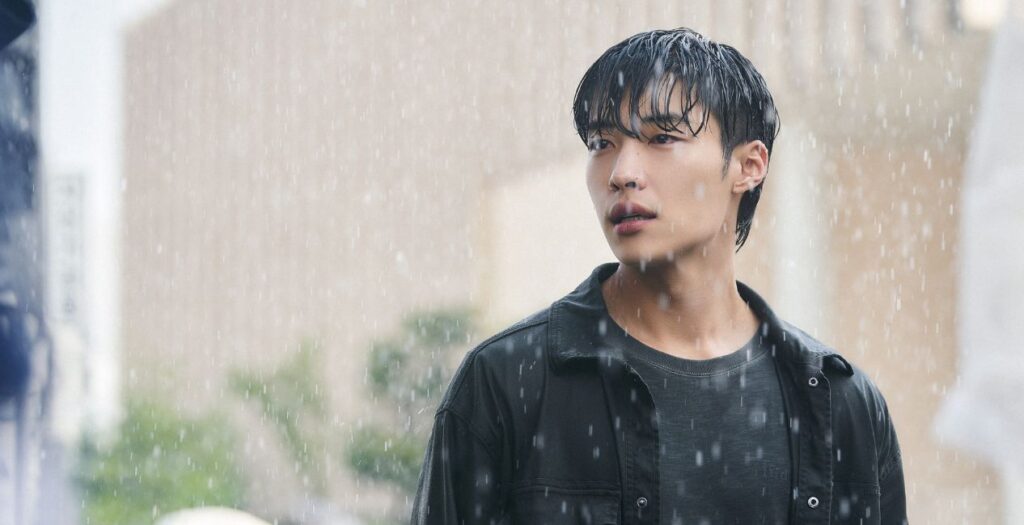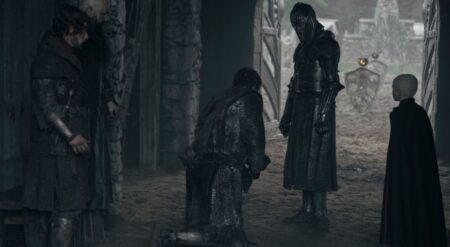Mr. Plankton, the latest Netflix K-drama from the writer of It’s Okay Not To Be Okay, is a testament to the complexities of life, particularly when confronting one’s end. Shining the spotlight on its three pivotal characters, all are forced to examine themselves in the wake of changes thrust upon them.
From abandonment to child cruelty to having one’s life entirely planned for them, the three are united by their desire for authentic love and acceptance. At just ten episodes, Mr. Plankton showcases Jo Yong‘s writing prowess and why one should have tissues on hand when watching her work play out.
Hae Jo (Woo Do-hwan) is a jack-of-all-trades blessed with incredible misfortune. Considered a nobody by society, he works on the outskirts to make ends meet, with lover/landlord/friend Bong Sook (Lee El) covering for him financially and his helper, Kka Ri (Kim Min-seok), taking work that is outside his scope of amusement. Hae Jo’s philosophy is to go where life takes him. Once things become boring, he moves to the next thing—this habit of his kicks into high gear when he receives incredibly devastating news.
The devastation doesn’t stop with Hae Jo. All Jo Jae-mi (Lee Yoo-mi) desires is to become a mother. After she learns she is infertile, her world collapses. But her public display of grief, with too much information provided by her, puts Jae-mi in Hae Jo’s sights once again. This leads to the day of her wedding to the Eo Family’s successor, Eo Heung (Oh Jung-se), where she’s trying to decide whether or not to break things off with the sweet lovebug of a man. Hae Jo crashes the wedding and kidnaps her, leading to eye-opening experiences for all involved in Mr. Plankton.
There’s a spectrum of differences in attitudes between Hae Jo, Jae-mi, and Heung. At the start of Mr. Plankton, Hae Jo is incredibly cynical and wears his pain and trauma on his sleeve even though he thinks he doesn’t show it. But the news he receives unearths the things he’s kept buried, prompting him to go on one final journey to find his father.
Bringing the former love of his love with him was purely coincidental but necessary for the growth of both Hae Jo and Jae-mi. From a performance level, Woo Do-hwan captures the layers that make what could easily be an unlikable character someone forgivable.
Mr. Plankton is all about the characters.

Jae-mi embodies characteristics seen in both Hae Jo and Heung. It’s no wonder she inspires them to hope and love in Mr. Plankton. Lee Yoo-mi plays Jae-mi with a lightness needed to balance out her more selfish and immature moments.
As a character, though, Jae-mi is incredibly relatable, particularly when she asks Heung if he’d chase her to the ends of the earth to find her. Her desire to love and be loved stems from an honest place, a pain that mirrors Hae Jo’s own, and when that pain is breached, Yoo-mi bares Jae-mi’s soul to the camera.
As for Heung, he falls more in line with the sheltered only son trope. He’s been both commanded and sheltered by his mother, Beom Ho-ja (Kim Hae-sook) since he’s the only successor to the Eo Family. Every inch of his life has been planned out for him, but his love for Jae-mi is his first step towards breaking his mother’s iron grip. Despite the age gap between Heung and Jae-mi, they are almost in sync. How Oh Jung-se gradually transitions his Heung from a bumbling, lovable oaf to someone collapsing in on himself is heartbreaking. But it is necessary for Heung’s transition.
Mr. Plankton is frustrating, gutwrenching, and a triumph in how it explores the complexity of human behavior when we lose control. Confronted with tragedy, how will we react? What do we reach out for as the darkness looms in closer? From the main characters to the supporting characters, each one operates differently when confronted with the ultimate loss, with each one making occasionally stupid decisions while grappling for control over an uncontrollable situation in their laps.
It is so easy to feel alone in these moments, and Mr. Plankton shows that in all of its beauty and equal ugliness. And for people director Hong Jong-chan would consider “plankton,” or at least the more invisible parts of society like Hae Jo and Jae-mi, more often than not, it is easy to forget the value they have. Mr. Plankton reminds us that everyone has value and that we are not as alone as we think, even as our worlds crumble.
Mr. Plankton sticks the landing and then some.

While the ending is telegraphed from Doo-hwan’s opening monologue, how it transforms in Mr. Plankton‘s final moments is nothing short of extraordinary. Jo Yong’s mastery of character development and infusing layers into her characters serve as a class on how to stretch out the story and make the most of the time given.
The shorter episode count—clocking in at ten episodes—aids in this task and ups the stakes surrounding Hae Jo’s fate. If Mr. Plankton had another episode or two, the story likely would have dragged on and suffered for it.
That said, the odd character in Mr. Plankton that could have used more finessing was John Na (Alex Landi). As Ho-ja’s subordinate and with minimal dialogue, there’s a natural air of mystery surrounding the bodyguard. How John’s story arc develops isn’t as clear, and a couple of more scenes explaining away the closeness between John and Ho-ha might have sold the end of his storyline a bit better. As is, it seems random to wrap his arc and part of Ho-ja’s arc this way.
Ultimately, Mr. Plankton is a guaranteed tearjerker with Jo Yong at the helm, and she once again proves that she still has it. This emotionally heartfelt journey explores the all-too-real complexities of human emotion, leaving everything out on the table for dissection. Pack yourself some tissues because this series will likely make you cry.
Mr. Plankton is streaming now, exclusively on Netflix.
Mr. Plankton
-
Rating - 9/109/10
TL;DR
Mr. Plankton is a guaranteed tearjerker with Jo Yong at the helm, and she once again proves that she still has it







